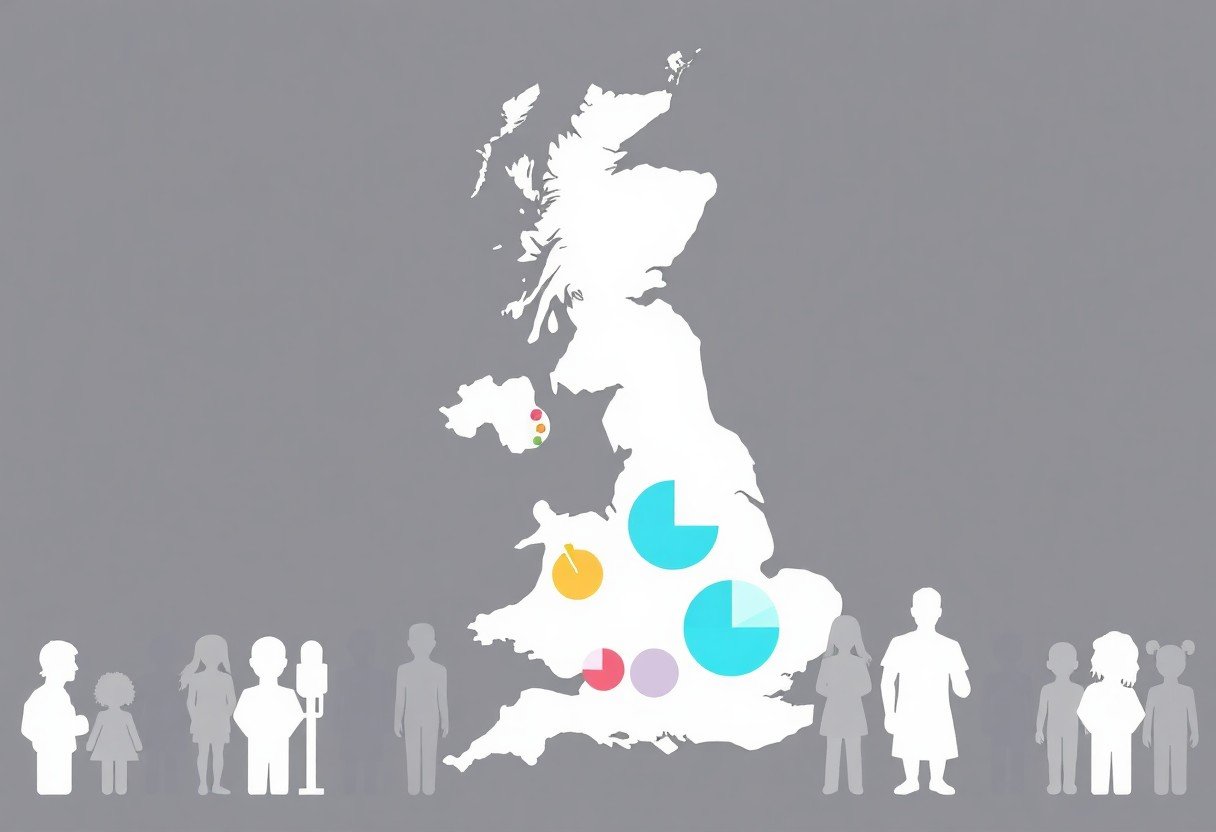📊 Personality Disorders in the UK – Prevalence and Trends
It’s crucial for you to understand the landscape of 📊 Personality Disorders in the UK – prevalence and trends, as these conditions can significantly affect mental health and well-being. Recent research highlights that approximately 1 in 10 people may be diagnosed with a personality disorder, with trends indicating a rise in awareness and diagnosis. Understanding the prevalence can empower you to identify symptoms, seek help, and support others. This post will explore the latest statistics, treatment options, and societal attitudes towards 📊 personality disorders in the UK, equipping you with valuable insights.
Key Takeaways:
- Personality disorders affect approximately 10% of the population in the UK, with varying degrees of severity.
- There is a notable increase in awareness and diagnosis of personality disorders over recent years, leading to more individuals seeking help.
- Antisocial personality disorder and borderline personality disorder are among the most common types identified in clinical settings.
- Symptoms and behaviours associated with personality disorders can significantly impact relationships, employment, and overall quality of life.
- Access to mental health services and effective treatment options remains a challenge, with increasing demand for specialised care and support.
Understanding Personality Disorders
While navigating the complex world of mental health, it’s vital to grasp the concept of personality disorders. These conditions manifest as enduring patterns of thoughts, feelings, and behaviours diverging significantly from cultural expectations, often causing distress or impairment in personal functioning. Understanding these disorders can aid in breaking the stigma surrounding mental health issues and promote greater empathy towards those affected.
Definition and Classification
Classification of personality disorders involves grouping them into distinct categories based on shared characteristics and behaviours. Typically, these are organised within the DSM-5 (Diagnostic and Statistical Manual of Mental Disorders) into clusters A, B, and C, encompassing various types of personality disorders. Each cluster reflects unique patterns of thought and behaviour that impact interpersonal relationships.
Common Types of Personality Disorders
Disorders classified as common personality disorders include:
| Cluster A | Paranoid, Schizoid, Schizotypal |
| Cluster B | Antisocial, Borderline, Histrionic, Narcissistic |
| Cluster C | Avoidant, Dependent, Obsessive-Compulsive |
| Other | Unspecified Personality Disorder |
| Overlap | Comorbidity with Other Disorders |
The awareness of these categories aids in identifying potential symptoms and seeking appropriate help.
Hence, a more detailed overview of common types of personality disorders will enhance your understanding of these conditions. You may encounter:
| Paranoid Personality Disorder | Excessive suspicion and distrust towards others. |
| Borderline Personality Disorder | Instability in moods, behaviour, and relationships. |
| Narcissistic Personality Disorder | Exaggerated sense of self-importance and lack of empathy. |
| Avoidant Personality Disorder | Severe shyness and sensitivity to criticism. |
| Obsessive-Compulsive Personality Disorder | Preoccupation with orderliness and control. |
The understanding of these disorders, along with their key characteristics, enables you to empathetically approach individuals facing such challenges.
Prevalence of Personality Disorders in the UK
Assuming you are interested in mental health statistics, the prevalence of personality disorders in the UK varies significantly. Recent studies suggest that approximately 6-10% of adults in the UK are affected by some form of personality disorder, with a higher incidence reported among those seeking mental health treatment. This highlights the need for increased awareness and understanding of these complex conditions within your community.
Statistical Overview
Disorders related to personality are prevalent, with estimates indicating that around 1 in 10 people in the UK may meet the criteria for a personality disorder at some point in their lives. The most common types include borderline, antisocial, and avoidant personality disorders, which can have a profound impact on individuals’ functioning and quality of life.
Demographic Variations
By examining demographic factors, you may notice that prevalence rates of personality disorders differ across various populations. For example, research indicates that these disorders are more frequently diagnosed in males, particularly those with antisocial traits. Age and socioeconomic status also play a role, as younger individuals and those in disadvantaged backgrounds are disproportionately affected.
Personality Disorders in the UK – Prevalence and Trends
Consequently, understanding demographic variations is imperative for tailoring interventions. For instance, younger individuals may exhibit more extreme behaviours, necessitating a different approach to treatment compared to older adults, who may present with more subtle symptoms. Furthermore, individuals from low socioeconomic backgrounds may face additional stressors, leading to higher rates of personality disorders. Recognising these variations enables mental health professionals to provide more targeted and effective support within different population groups.
Trends Over Time
Once again, the landscape of personality disorders in the UK has evolved significantly over time. Increased awareness and improved diagnostic practices have contributed to a more accurate understanding of these conditions. As more individuals seek help, you may observe a rise in reported cases, reflecting not just an increase in actual prevalence but also a shift towards destigmatisation and better recognition of mental health issues.
Changes in Diagnosis Rates
To highlight the changes in how personality disorders are diagnosed in the UK, it’s evident that advances in mental health awareness have impacted these rates positively. With improved training for healthcare professionals and efforts to standardise diagnostic criteria, you may find that more people are being accurately diagnosed and receiving the necessary support.
Influencing Factors
For various factors influencing the trends in personality disorder diagnosis, consider aspects such as increased public awareness, access to mental health services, and shifting societal attitudes. These can play a significant role in encouraging individuals to seek help. This is evident as more people open up about their experiences and symptoms, resulting in a higher prevalence of diagnoses.
Plus, the awareness campaigns and public discourse surrounding mental health are impacting how you perceive these conditions. Important factors include:
- Stigma reduction allows for open conversations
- Increased training for healthcare professionals on identifying disorders
- Policy changes in mental health services
This leads to greater understanding and treatment options available to you.
Impact of Personality Disorders on Society
Unlike many other mental health conditions, personality disorders can exert a profound influence on societal dynamics. Individuals with these disorders often face challenges that disrupt interpersonal relationships, employment stability, and overall community welfare. This can lead to a ripple effect, impacting family structures, workplace environments, and even public health systems, which eventually contributes to social tensions and increased stigma around mental health issues.
Economic Cost
Economic assessments indicate that personality disorders contribute significantly to healthcare expenditures and lost productivity. The financial burden on both public services and the private sector is staggering, as you may find that the costs associated with treatment, hospital admissions, and legal issues compound quickly, leading to an overall strain on the economy.
Social and Health Implications
Across the UK, personality disorders can lead to substantial challenges in both social interactions and overall health. Individuals may experience heightened levels of stress, anxiety, and depression, often affecting those around them. These disorders frequently correlate with higher rates of substance abuse and can create a cycle of instability in personal and professional lives, complicating treatment and recovery processes.
Disorders of this nature impact not just the individual, but their loved ones and communities as well. The social stigma surrounding personality disorders often leaves you feeling isolated, exacerbating feelings of rejection and low self-worth. Furthermore, the detrimental effects on mental health can lead to an increased risk of suicidal tendencies and the engagement in self-harming behaviours. These multifaceted issues highlight the importance of prompt intervention and comprehensive support systems to improve outcomes for those affected.
Treatment and Management Approaches
Despite the challenges associated with personality disorders, there are effective treatment and management approaches available that can significantly improve your quality of life. These often involve a combination of psychotherapy, medication, and support services tailored to your individual needs.
Psychotherapy and Counselling
Psychotherapy is a fundamental aspect of treatment for personality disorders. It provides you with a safe space to explore your thoughts, emotions, and behaviours. By engaging in therapeutic practices, you can develop coping strategies, improve interpersonal skills, and gain insight into your condition, ultimately fostering personal growth.
Medication and Support Services
Across various treatment plans, medication may be prescribed to help manage specific symptoms associated with personality disorders, such as anxiety or depression. Support services, including group therapy and community resources, can also play a significant role in your recovery process.
Treatment options for personality disorders are diverse and can vary widely depending on your specific needs. Medications may include antidepressants, mood stabilisers, or antipsychotics, aimed at addressing symptoms that disrupt your daily life. Furthermore, accessing support services can greatly enhance your recovery journey, providing you with peer support and practical resources. It’s imperative to work closely with your healthcare provider to identify the most suitable options for you, ensuring that you receive comprehensive care tailored to your situation.

Future Directions in Research
Not only is there a growing need for comprehensive studies on personality disorders in the UK, but exploring the complexities and interactions between various conditions can greatly improve treatment approaches. Research should focus on developing better diagnostic tools and interventions tailored to individual needs, enabling more effective mental health support for you and others affected by these disorders.
Emerging Studies
Future research is increasingly focusing on the biological and environmental factors contributing to personality disorders. New studies are investigating the interplay between genetics, neurobiology, and psychosocial factors, which could lead to enhanced understanding and innovative therapies for you and the community.
Policy Recommendations
Against the backdrop of rising awareness, it is vital for policy makers to implement changes that affect mental health services. You should advocate for increased funding towards research, early intervention programmes, and training for healthcare professionals in recognising and treating personality disorders effectively.
The implementation of effective policy recommendations can significantly improve mental health services for individuals with personality disorders. Increased funding can lead to better resources and support networks, ensuring that research into emerging therapies is prioritised. Training for healthcare professionals is vital, enabling them to identify and treat personality disorders more effectively. By supporting such initiatives, you can help create a system that prioritises mental health and leads to improved outcomes for those affected.
To wrap up
Summing up, understanding the prevalence and trends of personality disorders in the UK is crucial for recognising their impact on individuals and society at large. You should be aware that these disorders affect a significant portion of the population, and ongoing research highlights shifts in diagnosis and treatment approaches. By staying informed about these trends, you can better support those who may be struggling and advocate for improved mental health resources and interventions in your community.
FAQ
Q: What are personality disorders, and how are they classified in the UK?
A: Personality disorders are a type of mental health condition characterised by long-term patterns of behaviour and thoughts that differ significantly from societal expectations. In the UK, they are generally classified into three clusters: Cluster A (odd or eccentric behaviours), Cluster B (dramatic, emotional, or erratic behaviours), and Cluster C (anxious or fearful behaviours). These categories include various specific disorders such as paranoid personality disorder, borderline personality disorder, and avoidant personality disorder.
Q: What is the prevalence of personality disorders in the UK?
A: The prevalence of personality disorders in the UK has been estimated to be around 6% of the general population. However, this figure can vary, with some studies suggesting higher rates among specific groups, such as individuals seeking mental health treatment. It is important to note that these disorders often co-occur with other mental health conditions, which may complicate accurate prevalence assessments.
Q: Are there any emerging trends related to personality disorders in the UK?
A: Recent trends indicate an increased awareness and diagnosis of personality disorders in the UK. There has been a shift towards a more nuanced understanding of these conditions, leading to earlier identification and intervention. Additionally, there is a growing recognition of the impact of social factors, such as trauma and socio-economic status, on the development and persistence of personality disorders.
Q: How are personality disorders treated in the UK?
A: Treatment for personality disorders in the UK often involves a combination of psychotherapy and medication. Therapeutic approaches may include dialectical behaviour therapy (DBT), cognitive behavioural therapy (CBT), and schema therapy, tailored to the individual’s needs. Medication, such as antidepressants or mood stabilisers, may be prescribed to manage symptoms. Access to treatment varies, with availability dependent on local health services and funding.
Q: What are the challenges faced by individuals with personality disorders in the UK?
A: Individuals with personality disorders often face numerous challenges, including stigma and misunderstanding from society. This can lead to difficulties in accessing appropriate healthcare and support services. Additionally, the nature of these disorders can complicate relationships and employment, exacerbating feelings of isolation and frustration. Efforts to improve public awareness and reduce stigma are vital for enhancing the quality of life for those affected.







